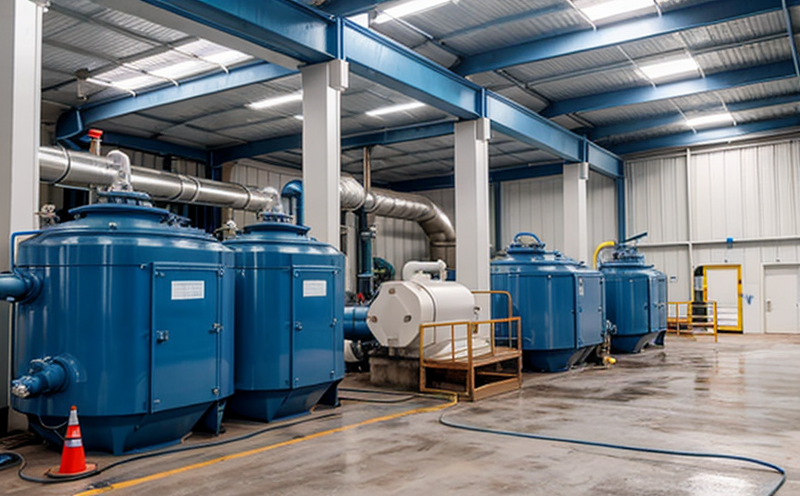EN 12566-3 Effluent Quality Testing for Wastewater Systems
The EN 12566-3 standard is a pivotal document within the framework of wastewater treatment systems, particularly focusing on ballast water management. This test ensures that effluents from shipboard wastewater treatment systems meet stringent environmental standards set by international maritime regulations.
The process involves sampling and analyzing the effluent to determine compliance with specified parameters outlined in EN 12566-3. These parameters are designed to mitigate the discharge of pollutants into aquatic environments, thereby protecting marine ecosystems against harmful substances like heavy metals, nutrients, and pathogens.
For quality managers and R&D engineers, this service is critical for ensuring that shipboard wastewater treatment systems not only meet but exceed regulatory requirements. Compliance with EN 12566-3 can significantly reduce the risk of fines or operational disruptions due to non-compliance. The test also supports continuous improvement in system design and operation.
The testing procedure involves several key steps:
- Sampling: Collection of effluent samples from designated points on board ships.
- Preparation: Preservation and preparation of the sample for analysis.
- Analysis: Utilization of specialized laboratory equipment to assess various parameters including chemical oxygen demand (COD), biological oxygen demand (BOD), total nitrogen, total phosphorus, pH levels, and specific gravity.
- Reporting: Detailed reporting of test results against EN 12566-3 standards.
The importance of this testing cannot be overstated. Ships are significant contributors to marine pollution due to their ballast water discharge practices. By adhering to EN 12566-3, ship operators can significantly reduce the risk of introducing invasive species and pollutants into sensitive aquatic habitats.
| Application Area | Description |
|---|---|
| Shipboard Wastewater Management | Ensuring compliance with international maritime regulations for the discharge of ballast water. |
| Sustainable Shipping Initiatives | Supporting environmental protection efforts by minimizing the ecological impact of ship operations. |
| R&D and Continuous Improvement | Providing data to enhance wastewater treatment technology and operational efficiency. |
The test is essential for ensuring that ships comply with the International Maritime Organization's (IMO) Ballast Water Management Convention. This convention aims to prevent the introduction of harmful aquatic organisms and pathogens into new water bodies through the discharge of ballast water, cargo residues, or sediments.
For quality managers and R&D engineers, this service is a cornerstone in maintaining high standards of environmental responsibility. It also serves as a benchmark for sustainability initiatives within the maritime sector. Compliance with EN 12566-3 can enhance a company's reputation and contribute to broader environmental goals.
Industry Applications
The application of EN 12566-3 effluent quality testing in the marine and ship equipment sector extends beyond mere compliance. It plays a crucial role in several key areas:
- Shipboard Wastewater Management: Ensuring that the discharge from ballast water systems adheres to strict environmental standards.
- Sustainable Shipping Initiatives: Supporting efforts to minimize the environmental footprint of maritime operations through reduced pollution and ecological impact.
- R&D and Continuous Improvement: Providing data necessary for refining wastewater treatment technologies and enhancing operational efficiency. This continuous improvement is vital in addressing evolving regulatory requirements and environmental challenges.
The service not only aids in meeting current regulations but also helps in anticipating future changes, ensuring that ship operators are always at the forefront of sustainable practices.
Why Choose This Test
- Comprehensive Compliance: Ensures full compliance with international standards set by EN 12566-3 and other relevant regulations.
- Data-Driven Decisions: Provides reliable data for decision-making, supporting the implementation of best practices in wastewater management.
- Risk Mitigation: Reduces the risk of penalties and operational disruptions due to non-compliance with environmental laws.
- Sustainable Operations: Contributes to sustainable shipping by minimizing the discharge of pollutants into the marine environment.
- Innovation Support: Assists in the development and optimization of wastewater treatment technologies, fostering innovation within the sector.
- Reputation Enhancement: Enhances a company's reputation for environmental responsibility and sustainability.
- Regulatory Leadership: Positions ship operators as leaders in adhering to and exceeding regulatory expectations.
The service is indispensable for maintaining high standards of environmental responsibility, supporting sustainable shipping practices, and enhancing operational efficiency. It provides a robust foundation for meeting current regulations while also preparing for future changes.
Environmental and Sustainability Contributions
The implementation of EN 12566-3 effluent quality testing significantly contributes to environmental sustainability in the maritime industry. By ensuring that wastewater is treated effectively before discharge, this service helps prevent the introduction of harmful substances into marine environments.
This not only protects aquatic ecosystems but also supports broader environmental goals. The reduction in pollutants discharged from ships can lead to healthier and more resilient marine habitats. This sustainable approach aligns with global initiatives aimed at preserving ocean health and biodiversity.
For compliance officers and R&D engineers, this service is a vital tool for maintaining operational integrity while contributing positively to the environment. It fosters a culture of environmental responsibility within organizations, ensuring that they remain leaders in sustainable practices.





